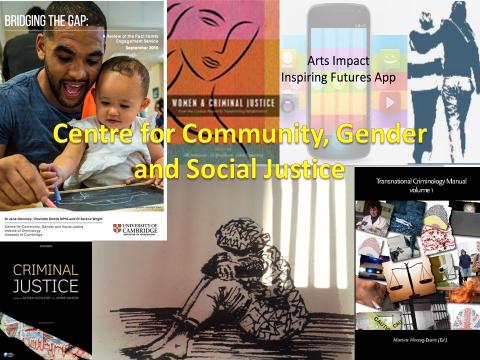
Submitted by S.L. Ellis on Tue, 19/09/2017 - 14:42
This year at the ESC 2017 conference in Cardiff, the FAIR team presented a range of papers on families and imprisonment based on data from the earlier study of imprisoned fathers and their families. Topics included the needs and experiences of the partners of imprisoned men; heterogeneity in behavioural outcomes of male prisoners' children; and "pains of imprisonment" that extend beyond individual prisoners to their family members.
See below for abstracts. Click the titles for the presentation slides.
Female partners of male prisoners: Questioning gender stereotypes
Ms Karen Souza (City, University of London)
Dr Lucy Markson (University of Cambridge)
Professor Friedrich Lösel (University of Erlangen-Nuremberg)
Dr Caroline Lanskey (University of Cambridge)
This paper discusses the family structures and processes of women who have a partner in prison, who is also the father of their children. Using a prospective longitudinal design, we collected quantitative and qualitative data from 38 women via semi-structured interviews during their partners’ imprisonment (Time 1) and within six months after his release (Time 2). The aims of this study were to: 1) examine the relationship between heterosexual couples that are separated by the man’s imprisonment; 2) examine the women’s situations and circumstances in terms of economic, health, and social factors; 3) explore the needs and experiences of women who have a partner in prison; and 4) identify the women’s sources of support throughout and beyond her partner’s imprisonment. Our findings question traditional assumptions about the female partners of male prisoners. We discuss implications for the personalisation and enhancement of existing services to better support women who are affected by their partner’s imprisonment.
Understanding heterogeneity in prisoners' children's behavioural outcomes by examining the influence of cumulative family risks and protective factors
Dr Lucy Markson (University of Cambridge)
Professor Friedrich Lösel (University of Erlangen-Nuremberg)
Ms Karen Souza (City, London University)
Dr Caroline Lanskey (University of Cambridge)
The negative impact of paternal imprisonment on children is well documented, but heterogeneity in developmental outcomes and resilience are less well understood. This mixed-method longitudinal study used measures of cumulative family risks (parent's education, mental health, drug and alcohol problems, poverty and father's criminal history) and potentially protective family processes (quality of parent's relationship, family support and problem-solving communication) to explain heterogeneity in the behaviour of 50 children of imprisoned fathers. Cumulative risk predicted behaviour problems. The relations between cumulative risk and behaviour problems were generally stronger for families in which there were few protective factors than those for which there were many, but the differences between these smaller subsamples were not statistically significant. Qualitative case histories were used to illustrate the quantitative findings regarding family protective processes. The findings suggest that the contextual family environment is important for understanding heterogeneity in development, but also underscore the challenges of revealing substantial protective effects in high-risk samples.
Prisoners’ families and the referred pains of imprisonment
Dr Caroline Lanskey (University of Cambridge)
Professor Friedrich Lösel (University of Erlangen-Nuremberg)
Dr Markson Lucy (University of Cambridge)
Ms Karen Souza (City, London University)
This paper will discuss the ways in which the pains of imprisonment extend beyond prisoners to their families and children. It will draw on data from a longitudinal mixed method study of the experiences of families in England during and after their father’s imprisonment (Lösel et al, 2012) and a small-scale evaluation of a support programme for prisoners’ children (Lanskey, 2017). Parental imprisonment was experienced differently within and across families, and while not all experiences were negative, there were common experiences of hardship. With reference to the work of Sykes (1958), Goffman (1961) and Crewe (2011) these personal and social hardships are conceived as ‘referred pains of imprisonment’. We will describe how these pains are experienced by prisoners’ families and will further distinguish between ‘acute’ and ‘chronic’ pains, that is, between the initial shock that can be experienced in the early stages of the criminal justice process and those pains which persist and weigh down on families over the longer term. The discussion will consider the value of adopting this theoretical approach and how it may be developed in the longer term.



